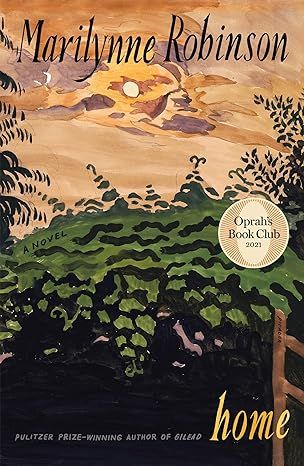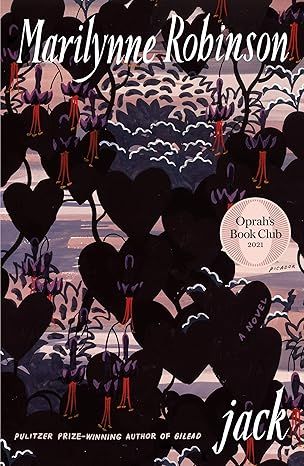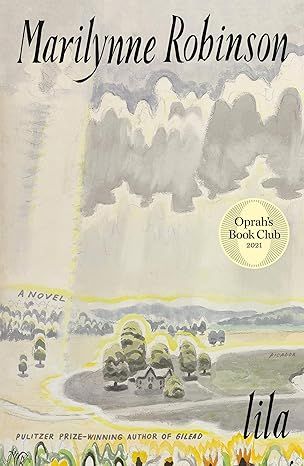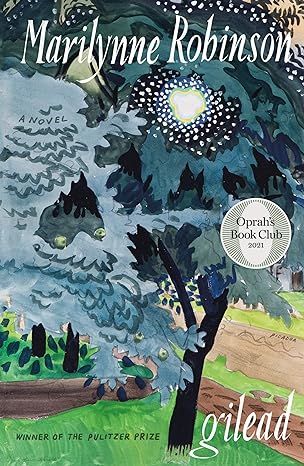Home (Oprah's Book Club): A Novel
4.2 out of 5
3,734 global ratings
A NEW YORK TIMES BESTSELLER • OPRAH��’S BOOK CLUB PICK • NATIONAL BOOK AWARD FINALIST • A NEW YORK TIMESE NOTABLE BOOK • WINNER OF THE LOS ANGELES TIMES BOOK PRIZE
A WASHINGTON POST BEST BOOK OF THE YEAR • A LOS ANGELES TIMES BEST BOOK OF THE YEAR • A SAN FRANCISCO CHRONICLE BEST BOOK OF THE YEAR
“[Robinson's] prose is our flight out, a keen instrument of vision and transcendence.” —O, the Oprah Magazine
Hailed as "incandescent," "magnificent," and "a literary miracle" (Entertainment Weekly), hundreds of thousands of readers were enthralled by Marilynne Robinson's Gilead. Now Robinson returns with a brilliantly imagined retelling of the prodigal son parable, set at the same moment and in the same Iowa town as Gilead.
A luminous and healing book about families, family secrets, and faith from one of America's most beloved and acclaimed authors.
The Reverend Boughton's hell-raising son, Jack, has come home after twenty years away. Artful and devious in his youth, now an alcoholic carrying two decades worth of secrets, he is perpetually at odds with his traditionalist father, though he remains his most beloved child. As Jack tries to make peace with his father, he begins to forge an intense bond with his sister Glory, herself returning home with a broken heart and turbulent past.
Home is a luminous and healing book about families, family secrets, and faith from one of America's most beloved and acclaimed authors.
336 pages,
Kindle
Audiobook
Hardcover
Paperback
Audio CD
First published August 3, 2020
ISBN 9781250784025
About the authors
Marilynne Robinson
Marilynne Robinson is the author of the bestselling novels "Lila," "Home" (winner of the Orange Prize), "Gilead" (winner of the Pulitzer Prize), and "Housekeeping" (winner of the PEN/Hemingway Award).
She has also written four books of nonfiction, "When I Was a Child I Read Books," "Absence of Mind," "Mother Country" and "The Death of Adam." She teaches at the University of Iowa Writers' Workshop.
She has been given honorary degrees from Brown University, the University of the South, Holy Cross, Notre Dame, Amherst, Skidmore, and Oxford University. She was also elected a fellow of Mansfield College, Oxford University.
Read more
Reviews
Amazon Customer
5
Family Dynamics
Reviewed in the United States on June 20, 2024
Verified Purchase
The black sheep comes home and his sister that needed to come home she thought to care for her dying father came together to heal each other. Excellent read.
HeatherL
5
Marilynne Robinson never disappoints
Reviewed in the United States on May 22, 2024
Verified Purchase
One of Robinson's four novels set in Gilead, Iowa, this novel is poignant and moving. She expresses profound truths via the thoughts and actions of her characters. Highly recommend!
M. Bones
5
Absolutely astonishing book but the audible version is intolerable
Reviewed in the United States on April 3, 2024
Verified Purchase
I have to say I enjoyed and admired this book more than Gilead and enough to make me want to read Gilead again—though I read it only months ago. The prose is as breathtaking as in Housekeeping and she doesn’t get as carried away with it as she occasionally did in that first book. Not having the ready excuse for sermonizing that Gilead provides also keeps her head above water and the clarity and depth of vision for all of the characters is truly extraordinary.
Unfortunately the narration for the audible version is so nauseatingly artificial & "poetic" that I simply couldn't listen to it, even when I was on a long drive. Very disappointing.
Read more
3 people found this helpful
BOB
5
Another father, a prodigal son returned, and a faithful daughter
Reviewed in the United States on July 5, 2020
Verified Purchase
One of what I considered to be failings of Marilynne Robinson’s ‘Gilead’ was the confinement within the mind of an aged minister, meaning that the reader was held captive to all the musings and concerns of John Ames, many of which were extensive theological debates with himself that struck one as a bit tedious if he wasn’t of the same spiritual persuasion or orientation as this minister. ‘Home’ takes place mostly in the home of Ames’ best friend, also an aged minister, Robert Boughton. Boughton’s health is even more debilitated than Ames’ as he is mostly bedridden whereas Ames still preaches at a church.
Robinson seems to be comfortable with novels that largely take place in one location. Her debut, ‘Housekeeping’, mostly occurred either in the house where the “keeping” took place or by the fatal railroad tracks that traversed the lake. ‘Gilead’ mainly took place in Ames’ home, certainly in Ames’ mind. And ‘Home’ takes place mostly at—home.
As Boughton’s heath has deteriorated, his youngest daughter, Charity, has come home to take care of him. Charity, at 38, is already approaching middle age, her almost engagement/marriage never occurring (the fiancé was, among other things, already married and, ultimately, never going to divorce his wife). She feels she has little to show for her years; taking care of her father is her purpose in life at this point.
After Charity has been back home in Gilead for a while, they receive a letter from Jack, the ne’er do well son whom they haven’t seen in 20 years, saying that he is thinking of visiting the old home again. Charity and her father both have an “I’ll believe it when I see it” attitude toward seeing Jack again. Yet he surprises them, now in his forties, very thin and looking like he’s been through a ringer but trying to appear respectable.
Charity and her father both go out of their way to appear welcoming, to not hold grievances against him and to be forgiving of any past transgressions. Jack realizes this and appreciates Charity’s lack of judgment, as an embodiment of her name in Biblical terms to which they both can relate. He lowers his guard partially and tries to go through the motions, getting the car in running order, cleaning up the barn, helping Charity care for their father, generally trying to make himself feel useful. Robinson repeatedly describes Jack as putting his hand over his face. It occurs so frequently that it must be significant. I feel that the gesture is Jack’s refusal to face certain regrets, look at unpleasant memories, or exposing a vulnerability to harsh judgment.
Jack does stay longer than anyone expected but there is always an element of tension in the air. Will he drink again? Will he steal again? Will he just give up and leave, at this point almost guaranteeing that he will never see his father again? The novel almost seems like a play, mostly occurring in one location, the “home”, in all senses of the word, of the title. While it does have quite a bit of dialogue, there is far too much exploration of inner thoughts and emotions to accommodate a stage play. For the first half of the novel, there are only three “on stage” characters. Finally, in the second half, they invite Ames, his wife, Lila, and his young son, Robby, over for dinner.
Jack inserts inquiries into the theological discussions that Ames and his father have and which Ames considers mocking but which are actual sincere questions from Jack. He really does try to believe. He’s read the Bible a few times cover to cover so he is certainly familiar enough with the belief system. Having read ‘Gilead’ previously, we know Ames’ attitude toward Jack in greater detail and this time we have more input from Ames’ wife Lila who actually gives Jack some benefit of the doubt and Robby, who warms up to Jack immediately with innocent acceptance.
Boughton’s courtesy with his son begins to erode as Jack extends his stay and as his own physical and mental faculties begin to deteriorate. He expresses a barely expressed urgency that Jack give him some assurance of his honest Christian belief, that he not be consigned to perdition. Jack is already in the middle of a state of perdition and he cannot pretend to express a certainty that he does not sincerely feel. The best he can say to his father is that he has tried to believe.
The cast expands slightly when their physician brother Teddy arrives for a brief visit at the worst possible time. Charity discovers Jack in a severely hungover state and realizes he’s been hiding liquor in the barn and his bedroom during much of his stay and efforts at putting up a brave face have weakened as the need for his chemical crutch has become more extreme. Jack tries the best he can to appear functional with his brother and Teddy is extremely solicitous but admits that he probably won’t ever see his brother again, knowing that Jack is planning his departure soon.
Teddy has contacted the other siblings about coming to visit their father as soon as possible as he doesn’t have much time left. Before Jack leaves he says he will attempt to communicate with Ames once more and be as forthcoming as possible. This is the conversation that occurred near the ending of ‘Gilead’. We know why Jack reacts so strongly to the reactions from the authorities toward the black protestors (it’s the mid-50’s) when his father says they’re making the situation harder on themselves. Jack tries to enlighten his father on the real story of Emmett Till, which his father did not fully understand. He gives up any further effort when it appears unlikely his father will be sufficiently enlightened.
Jack has been writing letters to his wife, unanswered presumably, as her mail has been intercepted by her minister father. Jack will never fully explain the situation other than that he met his wife in St. Louis a few years ago and her father did not approve of their union. When his wife and their son finally appear, a few days after Jack has left, Charity understands the circumstances more fully.
‘Home’ has an elegiac quality to it. There is pervasive sadness inherent in the prose as we realize that some divisions can never be mended. Jack may never change his behavior or turn his life around. Robinson expresses these conflicts through the Christian terminology she and the characters share, unapologetically. Robinson’s Christianity exists simultaneously with the acknowledgment of bitterness and desolation. Charity sums up the attitude of her parents and inherited by her: “Her parents were, in their way, fully as innocent as she was, having put aside their innocence on practical grounds, not in the belief that it had been discredited, but because they accepted the terms of life in this world as a treaty to be preferred to conflict, though by no means ideal in itself. Experience had taught them that truth had sharp edges and hard corners, and could be seriously at odds with kindness.”
One thing that Robert Boughton often preached and found somewhat more difficult to live, could be summarized in the statement, “If you forgive, you may indeed still not understand, but you will be ready to understand, and that is the posture of grace.” Even if old Boughton cannot quite reach that state regarding Jack, his daughter, empathizing through her own unwise decisions and personal pain, can.
Read more
35 people found this helpful
Mac6uffin
5
Return to Gilead. Iowa, Not That Other One
Reviewed in the United States on May 3, 2024
Verified Purchase
When initially published, Home was a companion novel to Gilead, now part of a tetralogy. In Gilead we had elderly John Amos writing a novel-length letter to his young son knowing he wouldn't be around much longer. While it started with Amos's life and his family's story, it drifted into recent events regarding his best friend Reverend Robert Boughton on the occasion of Robert's son Jack returning after many years away. This novel centers on Glory, daughter of Robert, who has returned to her childhood home to take care of Robert near the end of his life. Jack returns as we read in the previous novel, and we see events from Glory's point of view. Marilynne Robinson reminds me of a midwestern Faulkner, with her beautiful prose and intertwining lives in small town Iowa. Full of internal thoughts and relationships, the ending reaches that bittersweet conclusion that the best stories often leave us with. Highly recommended.
Read more
Bob and Kristi
4
Moving account of familial love and redemption
Reviewed in the United States on April 10, 2016
Verified Purchase
Home is truly a story of homecoming. It is a parallel story with the book Gilead, which is written from the autobiographical perspective of Reverend Ames. Home is written in the third person, and centers most fully around these three characters in this order: Glory, Jack, their father (Rev. Robert Boughton). Marilyn Robinson hits another home run with this down to earth, moving account of familial love and redemption. She hits on theological themes, interwoven with the warp and woof of everyday ordinariness. Her characters are likable, as we can identity in different ways perhaps with each of them. The author invites us into the kitchen, the parlor, the dining room, the bedrooms, the garden, the barn and into the intimacy of the Boughton family, allowing us to witness the joys and sorrows and memories of a family which are the essence of life lived and experienced. While largely told from the perspective and experiences of Glory, the story’s focal point centers upon the prodigal Jack. The interactions between the three main characters demonstrate hope, frustration, openness and growing trust, mystery and uncertainty, and ultimately an unglorified yet powerful redemption. The book also deals with black and white racial issues which are an important part of Jack’s life and bely the realities of 1950s America, also reminding us of the same tensions most of us continue to try to understand today. In conclusion, Jack is loveable and worth knowing. Glory is a pearl of great price. Robert Boughton is a humble, dignified man seeking to understand his son as his love cannot release him. I highlight recommend Home by Marilyn Robinson.
Read more
8 people found this helpful
Katharine B.
4
"the heart of man is like deep water"
Reviewed in the United States on March 6, 2015
Verified Purchase
Years ago I read Gilead. And had forgotten most of it before reading Home. So I finished Home, and then promptly read Gilead again.
Home, taken as if reading it first, is a book that leaves you aching to know certain things that it doesn't tell you, and wanting to grab one of the characters to find out. If you read Home by itself, you have no idea what might be in the letter Jack finally receives. And you really, really, want to know. Which is not necessarily a bad thing; Home is an excellent book in its own right. It's just a different book depending on whether you read it first or second.
This is only one example. At many points I want to have a conversation with one of the characters. They have been made that real. I care about their lives and want to reach in and do something.
Of course, one of the points of the book--or maybe I should say, of both books taken together--is "the heart of man knows its own bitterness, and a stranger cannot enter into its joy." That sounds so modern and so true. Well, it is true . . . but not modern. So, if I could reach into the book and talk to one of the characters, either I would have an unfair advantage--knowing more about the situation than the characters do--or I'd promptly find myself in the real world with them (see what I just said?!)--where there is so much we don't know, and that affects everything.
Part of the genius of these two books taken together (I haven't read Lila yet) is the overwhelming portrait of the partiality of human knowledge of other people, and how even well-founded impressions of others and assessments of events may be grievously partial or out of date. And yet events can move more quickly than these incompletenesses can necessarily be overcome.
At the end, it's worth thinking about how only God has the full view of every person and every event. We most certainly do not. Part of Robinson's genius is helping us to sympathize in turn with a variety of characters who may take very opposite views of what is happening--because there is a life story there to be understood, a real set of experiences, hopes, sorrows to be reckoned with, as well as real failures.
Another theme in the book is silences--how often our readings of what isn't said change everything, and how often saying or asking something would make a difference, and yet it doesn't happen--often for understandable reasons, and yet sometimes with tragic results. Perhaps there is a nudge there towards trying to notice what needs to be asked. "The heart of man is like deep water, and a man of understanding draws him out." (Not a quotation from Robinson.)
A careful reading of these two books leaves you able to compare Ames' view of things with Jack's as you visit the same conversations--or the same intervals between conversations--from the vantage point of each man's thoughts. I could well imagine reading these two books yet again with certain specific questions in mind now. Jack did that when? Was that after that conversation with Ames, or before this one?
Some have said the voice of Glory is less well-developed than the voice of Ames. That is true, but Glory is not the only main character in this book. And Jack is painted unforgettably. He may remind you of someone you know and he will force you to ask yourself, maybe more deeply, how can I help such a person.
In Home you think you see him offered grace and not believing it could be for him. In Gilead you see something slightly different. You will want to know what happens in the end. And you will not know.
But meanwhile, the transformation of Glory's attitude toward the dark old house, so unlike what she loves or had ever hoped for, and the reasons for it, are beautiful. She is by no means a minor character. Not everyone can be Ames, or Ames wouldn't be himself.
There is a wonderful hint in Home that Lila is a character we need to understand better, because she is only given a few sentences in this book, and yet cuts to the heart of Jack's situation in a way that the more involved characters are unable to because of their background with Jack. I hope that in Lila we will get a fuller picture of what gave her the confidence to say "You can change. Everything can change."
In the end, maybe that is the message of the trilogy. But as real people with real burdens, we need to know how--just as Jack needed to know. And we will need to look outside these books to the book they so much point to, to find out.
Read more
5 people found this helpful
JohnC
4
More subtle than Gilead
Reviewed in the United States on March 27, 2024
Verified Purchase
Home is a worthy continuation of the story that Marilyn Robinson began in Gilead for readers who appreciate the underlying biblical theme that she exposits in these books: the implications of John Calvin’s doctrine of predestination. However, this iteration of her story may be too subtle for readers who are uninterested in that theme.
Calvin’s reluctant and paradoxical conclusion from Scripture is that salvation is God’s to bequeath, and that He bequeaths it unconditionally to a limited number of people. Robinson is a Calvinist who wrestles in these two books with this inescapable conundrum. She again delivers her story through Biblical archetypes. Gilead reimagined the Old Testament books of Proverbs and Ecclesiastes. Home reimagines Jesus’ parable of The Prodigal Son and blends it with hints of His parable of The Lost Sheep.
In Home the returning prodigal is Jack Boughton, the incorrigible son of Rev. Robert Boughton. We met him in Gilead. The older brother of Jesus’ parable is cleverly reimagined by Robinson as Jack’s maiden, conflicted younger sister, Glory.
Jack lives with the desperate knowledge that he’s damned and can do nothing to change his eternal destiny, despite the fact that he was born to a godly pastor and raised in a devout Christian home. It soon occurs to us that we are reading a horror story, on par with Sartre’s play, No Exit. The best horror writers move terror into the periphery so as to not chase the reader away with unbearable shock. Sartre staged his story in an elegant apartment. Robinson stages hers in Jack’s childhood home. But both are alluding to the unthinkable.
Home is not as evocative as Gilead, but it will stick longer in the mind of the reader who understands the theme it peels back.
Read more
Lynne M. Spreen
4
Disturbing but Expertly Crafted
Reviewed in the United States on September 23, 2013
Verified Purchase
I loved Gilead by Marilynne Robinson so much. But with Home, I had a different experience. I wasn't compelled through most of the book. At about the three-quarter mark, things started to happen and I felt my interest quicken. But here's a summary of my impressions, and my apologies to those who loved it so much they recommended it to me:
- I was disappointed to see this other, peevish, nasty side of Rev. Ames.
- I didn't like the Rev. Boughton very much at all.
- Jack is tedious and pathetic.
- Glory almost breaks free but then doesn't.
Robinson really makes me wait for it, building my conflict between compassion and resentment for Jack. And just when I lose faith in him, there's a scene where the old misogynist/bigot Rev. Boughton asks to see Jack and his brother together in his room, and Jack insists Glory be included. As if he sees her as an equal to the men, rather than just the servant her father expects.
In this, I felt Jack himself was a Rorschach test for the reader, in that while he seems almost feral, a man born without skin with which to hide himself from the world, easily wounded and always untrusting, you want to abandon him, but can you? If so, who are you? What are your values - what are your limits?
So now Glory has decided to stop being codependent with her "fiancé", and switch her ministrations and self-sacrifice to her dying father and her feral brother. This is an arc? This is growth? What is Robinson's meaning, at the end of the story, when Glory decides to stay in a town she has said she hates, in a house she agrees to preserve as a monument/mausoleum to the family? It can only be read as failure to respect oneself in favor of service to others! This troubles me deeply.
I apologize for the length of this next excerpt, but I have to reproduce it, because it's so telling:
"(Glory) had tried to take care of (Jack), to help him, and from time to time he had let her believe she did. That old habit of hers, of making a kind of happiness for herself out of the thought that she could be his rescuer, when there was seldom much reason to believe that rescue would have any particular attraction for him. That old illusion that she could help her father with the grief Jack caused, the grief Jack was, when it was as far beyond her power to soothe or mitigate as the betrayal of Judas Iscariot. She had been alone with her parents when Jack left, and she had been alone with her father when he returned. There was a symmetry in that that might have seemed like design to her and beguiled her with the implication that their fates were indeed intertwined. Or returning herself to that silent house might simply have returned her to a s state of mind more appropriate to her adolescence. A lonely schoolgirl at thirty-eight. Now, there was a painful thought.
"She recalled certain moments in which she could see that Jack had withdrawn from her and was looking through or beyond her, making some new appraisal of her trustworthiness, perhaps, or her usefulness, or simply and abruptly losing interest in her together with whatever else happened just then...She found no consistency in these moments, nothing she could interpret. He was himself. That is what their father had always said, and by it he had meant that Jack was jostled along in the stream of (the family's) vigor and purpose and their good intentions, their habits and certitudes, and was never really a part of any of it. He had eaten their food and slept beneath their roof, wearing the clothes and speaking the dialect of their slightly self-enamored and distinctly clerical family..."
God! Who hasn't known people like this - men like this, children like this - who take and take and take from an ever-hopeful spouse or family and yet never seem quite able to be satisfied, or fulfilled, or happy! When all the sacrificial loving family member ever wants is for that feral person to be happy. Or at least safe.
Like I said, Rorschach.
And in this, I have to admit, Robinson delivers again, most profoundly, in pulling back the curtains and showing us, right down to the faint beat of a pulse along a pale wrist, the impact on a family of such a lone wolf. Not that the wolf doesn't suffer. Not that we don't all feel empathy as we struggle to surface from this mire, gulping and gasping air, sorry for Glory who remains below, yet intent on saving ourselves. Lynne Spreen, author of the award-winning midlife novel Dakota Blues
Read more
9 people found this helpful
voracious reader
3
Boring & Tedious
Reviewed in the United States on December 1, 2010
Verified Purchase
I read both Gilead and Housekeeping and thoroughly enjoyed them both. I suspect that Robinson was pushed by her publisher to create another novel to ride on the coat tails of her Pulitzer Prize winning Gilead. This is what she produced. It is filled with the lyrical and beautiful language found in Gilead and Housekeeping. It just doesn't say much. There is little or no plot, and though I often love character driven novels, this was a bit thin. Maybe I just didn't get it. What was all the fuss about touching Jack's things. Just hanging up his jacket was an earth shattering event. Why could there never be a frank discussion between Glory and Jack? I tried to cast the characters with movie stars to try to make it come alive for me. I used Brad Pitt for Jack, but I could not think of an actor for Glory or the Reverend. Glory is definately a tragic figure, but it is a tragedy of her own making. Why did she return to Gilead after her disappointment with romance? Why didn't she give it another try in the big city? Jack is an alcoholic, the father of a child born out of wedlock, and a thief. He took no responsibility for the child. But why must the whole family walk on eggshells around him? He is a character with many tragic flaws. If he returned home to see if he could be forgiven and brought back into the fold, I sure didn't get it. Maybe all this wasp subtlety is beyond my experience. I grew up with an expressive volatile family , and this book just didn't speak to me. This was supposed to occur in the 60's. Yet merely going for a drive in a car was a big event. Racial views even among the clergy were hardly "christian" or up to date. Was Jack supposed to be a better person because of that? Why did he not join his wife where she was living if life in Gilead would have been so impossible. It just didn't make sense to me. The end was a novel twist and gave the book some oomph at last. But if the book was about the end, it came too late and should have been the center of the story. If you have read Gilead but not Housekeeping, read Housekeeping. Skip this one. Its boring.
Read more
8 people found this helpful
Top Marilynne Robinson titles
Best Sellers

The Tuscan Child
4.2
-
100,022
$8.39

The Thursday Murder Club: A Novel (A Thursday Murder Club Mystery)
4.3
-
155,575
$6.33

Sapiens: A Brief History of Humankind
4.6
-
140,302
$13.49

The Butterfly Garden (The Collector, 1)
4.3
-
88,556
$9.59

Things We Hide from the Light (Knockemout Series, 2)
4.4
-
94,890
$11.66

The Last Thing He Told Me: A Novel
4.3
-
154,085
$2.99

The Perfect Marriage: A Completely Gripping Psychological Suspense
4.3
-
143,196
$9.47

The Coworker
4.1
-
80,003
$13.48

First Lie Wins: A Novel (Random House Large Print)
4.3
-
54,062
$14.99

Mile High (Windy City Series Book 1)
4.4
-
59,745
$16.19

Layla
4.2
-
107,613
$8.99

The Locked Door
4.4
-
94,673
$8.53




